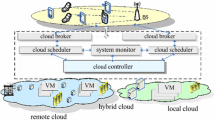Abstract
Mobile computing is pervading networks at an increasing speed as mobile devices are used with diverse forms of wireless technologies to access data. This paper evaluates different cloud-supported mobile services subject to limited capacity, as the selection of a service may introduce additional costs, such as those that derive from the additional amount of memory required for processing. In this context, a novel linear model and algorithm in the mobile cloud computing environment are proposed from the service capacity perspective, considering the cost that derives from the unused capacity. The probability of overutilization or underutilization of the selected service is also researched, once a linear growth in the number of users occurs. To further make effective and strategic investment decisions when selecting the appropriate cloud-based mobile service to lease off, the model formulation is based on a cost–benefit appraisal. The proposed quantification approach is evaluated with respect to four different case scenarios, exploiting a web tool that has been developed as a proof of concept and implementing the algorithm to calculate and compare the benefits and costs in the mobile cloud-based service level.





Similar content being viewed by others
Explore related subjects
Discover the latest articles, news and stories from top researchers in related subjects.References
Amir Y, Awerbuch B, Danilov C, Stanton J (2002) Global flow control for wide area overlay networks: a cost-benefit approach. In: 2002 IEEE open architectures and network programming proceedings, pp 155–166
Andrews M, Dinitz M (2009) Maximizing capacity in arbitrary wireless networks in the SINR model: complexity and game theory. In: IEEE INFOCOM’09, Rio de Janeiro, pp 1332–1340
Buyya R, Yeo CS, Venugopal S, Broberg J, Brandic I (2009) Cloud computing and emerging IT platforms: vision, hype, and reality for delivering computing as the 5th utility. Future Gener Comput Syst 25:599–616
Cisco Systems, Inc. (2015) Cisco visual networking index: global mobile data traffic forecast update, 2014–2019. http://www.cisco.com/c/en/us/solutions/collateral/service-provider/visual-networking-index-vni/white_paper_c11-520862.pdf. Accessed 27 Aug 2015
De Assunçao MD, Di Costanzo A, Buyya R (2009) Evaluating the cost-benefit of using cloud computing to extend the capacity of clusters. In: Proceedings of the 18th ACM international symposium on High performance distributed computing (HPDC’09), pp 141–150
De Assunção MD, Di Costanzo A, Buyya R (2010) A cost-benefit analysis of using cloud computing to extend the capacity of clusters. Clust Comput 13:335–347
Ericsson AB (2013a) Networked society essentials. http://www.ericsson.com/res/docs/2013/networked-society-essentials-booklet.pdf. Accessed 27 Aug 2015
Ericsson AB (2013b) Ericsson mobility report: on the pulse of the networked society. http://www.ericsson.com/res/docs/2013/ericsson-mobility-report-june-2013.pdf. Accessed 27 Aug 2015
Fernando N, Loke SW, Rahayu W (2013) Mobile cloud computing: a survey. Future Gener Comput Syst 29:84–106
Gao H, Chen T (2007) H\(\infty \) estimation for uncertain systems with limited communication capacity. IEEE Trans Autom Control 52:2070–2084
Goldsmith AJ, Varaiya PP (1997) Capacity of fading channels with channel side information. IEEE Trans Inf Theory 43:1986–1992
Kondo D, Javadi B, Malecot P, Cappello F, Anderson DP (2009) Cost-benefit analysis of cloud computing versus desktop grids. In: 2009 IEEE international symposium on parallel & distributed processing (IPDPS’09), Rome, pp 1–12
Li X, Li Y, Liu T, Qiu J, Wang F (2009) The method and tool of cost analysis for cloud computing. In: 2009 IEEE international conference on cloud computing (CLOUD’09), Bangalore, pp 93–100
Mobile Cloud Computing Lab, The Hong Kong Polytechnic University (2013) Mobile cloud computing. http://www4.comp.polyu.edu.hk/csbxiao/MCCLab/MCCLab_background.html. Accessed 27 Aug 2015
Molisch AF, Win MZ, Choi YS, Winters JH (2005) Capacity of MIMO systems with antenna selection. IEEE Trans Wirel Commun 4:1759–1772
Nallur V, Bahsoon R (2012) A decentralized self-adaptation mechanism for service-based applications in the cloud. IEEE Trans Softw Eng 39:591–612
Rhee W, Cioffi JM (2000) Increase in capacity of multiuser OFDM system using dynamic subchannel allocation. In: 2000 IEEE 51st vehicular technology conference proceedings (VTC), Tokyo, pp 1085–1089
Skourletopoulos G, Bahsoon R, Mavromoustakis CX, Mastorakis G, Pallis E (2014) Predicting and quantifying the technical debt in cloud software engineering. In: Proceedings of the 2014 IEEE 19th international workshop on computer aided modeling and design of communication links and networks (CAMAD’14), Greece, pp 36–40
Skourletopoulos G, Bahsoon R, Mavromoustakis CX, Mastorakis G (2015) The technical debt in cloud software engineering: a prediction-based and quantification approach. In: Mastorakis G, Mavromoustakis CX, Pallis E (eds) Resource management of mobile cloud computing networks and environments, 1st edn. IGI Global, Hershey, pp 24–42
Wang R, Giannakis GB (2004) Approaching MIMO channel capacity with reduced-complexity soft sphere decoding. In: 2004 IEEE wireless communications and networking conference (WCNC), vol 3, pp 1620–1625
Acknowledgments
The authors would like to thank the anonymous reviewers for their constructive comments, insights and feedback on the manuscript submitted to Soft Computing Journal. Their suggestions have contributed greatly to the high quality and improvement of this research work.
Author information
Authors and Affiliations
Corresponding author
Ethics declarations
Conflict of interest
G. Skourletopoulos declares that he has no conflict of interest. C. X. Mavromoustakis declares that he has no conflict of interest. G. Mastorakis declares that he has no conflict of interest. J. Mongay Batalla declares that he has no conflict of interest. J. N. Sahalos declares that he has no conflict of interest.
Ethical approval
This article does not contain any studies with human participants or animals performed by any of the authors.
Additional information
Communicated by F. Pop, C. Dobre and A. Costan.
Rights and permissions
About this article
Cite this article
Skourletopoulos, G., Mavromoustakis, C.X., Mastorakis, G. et al. An evaluation of cloud-based mobile services with limited capacity: a linear approach. Soft Comput 21, 4523–4530 (2017). https://doi.org/10.1007/s00500-016-2083-4
Published:
Issue Date:
DOI: https://doi.org/10.1007/s00500-016-2083-4




